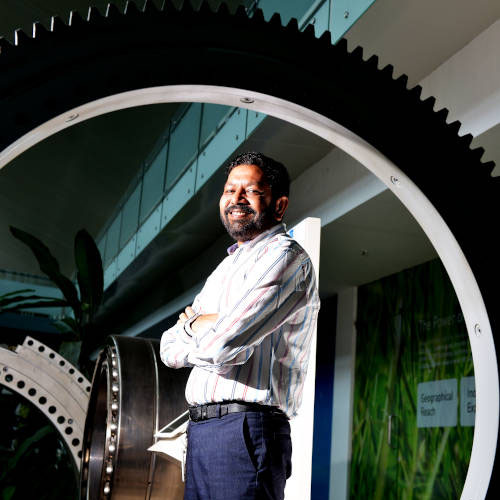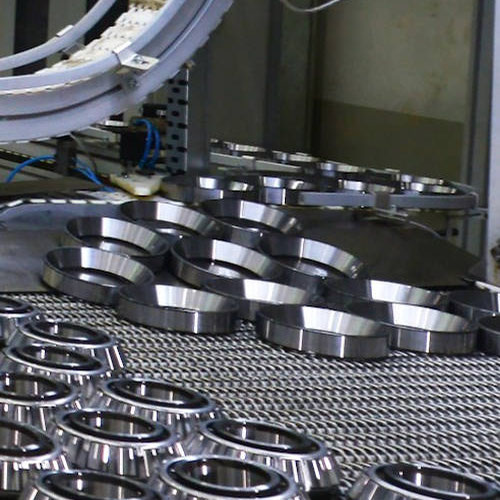-

Sharma: carbon neutral by 2030
SKF began remanufacturing in 2010. REP was introduced in India in 2018. Nearly 20 per cent of the company’s industrial clients have now opted for REP. Besides, bearing remanufacturing can result in a significant reduction of CO2 emissions, compared to the production of a new bearing. Remanufacturing requires up to 97 per cent less energy than producing a new bearing. By extending the service life of bearings, the process avoids the scrapping of components and the unnecessary use of natural resources.
SKF has always recognised the importance of remanufacturing for heavy industries, such as metals, mining, mineral processing & cement, pulp & paper and marine products. In addition, SKF remanufacturing units offer cost-effective and environment-friendly solutions to railway customers.
One example is SKF’s offer to repair, remanufacture and refurnish spindles, bearings and gearboxes, thus increasing the life of the product significantly, without any loss in performance. The remanufacturing and refurbishment helps the customer to reduce the total cost of ownership. In fact, SKF refurbished over 11,000 railway bearings in 2020, which contributed to significant savings as well as reducing about 1,100 tonnes of CO2 emissions.
Customer base
As India’s leading technology and solutions provider of bearings and units, seals and lubricants and monitoring services, the consumer base of SKF is constantly expanding. “SKF is number one globally, as also in India,” remarks Bhatnagar. “The legacy of who we are is of importance, because ‘when you think bearings you think SKF’.”
SKF India continues to dominate the automotive and industrial market in India. Its long-standing association with India, and the quality of its products underline its reputation as a reliable company. Its largest customers are Bajaj for two-wheelers, and Tata, Mahindra, John Deere, TVS and Yamaha for four-wheelers. On the industry side, the company’s biggest customers include the Railways, defence, wind turbines, cement, metals, mining, pulp & paper, automation, machine tools and aerospace.
“We would like to thank SKF India for supporting us wholeheartedly in a truly challenging situation (pandemic), to meet our requirements of bearings and lock nuts for the DRDO oxygen compressor project,” acknowledges Aman Kirlosker of Kirlosker Pneumatic Co. “SKF alone could have met our demand in such a short span of time.”
SKF India’s first plant was set up in Pune in 1965. The other plants are located in Bengaluru (1989), Ahmedabad (2010) and Haridwar (2010) – all of them make bearings. The company has two factories – one in Mysuru and the other in Bengaluru – which make lubricants under the Lincoln brand.
-

Bhagania: focus on digitisation
“Out of our total production of bearings, 50 per cent comes from the Pune factory, while 60 per cent of the industrial demand is met through imports,” says Sailesh Sharma, director, manufacturing, SKF India.
The Pune plant makes both industrial and automotive bearings, while Ahmedabad takes care of industrial bearings and Haridwar automotive bearings. “Bearings are exported to Europe, Latin America, Australia, the US and South Africa from different factories across India,” Sharma adds. The total steel consumption by SKF manufacturing units is about 8,500 tonnes per month. Out of this, 80 per cent is sourced locally and the remaining is imported.
Nearly 20 million two-wheelers are made in India every year, and each unit has 14-15 bearings. SKF India has a 50 per cent market share in bearings in the automotive sector and 50 per cent in the industrial sector.
“SKF India is one of the prominent players in bearings and seals, which find applications in auto and other industries,” observes Ashish Kapur, CEO, InvestShoppe. “This MNC operates in two key segments – automotive and industrial. While the auto segment has seen a sharp recovery post-pandemic, the industrial segment has been underperforming, for the last few quarters.
Considering many core industries are announcing aggressive capex plans, the industrial segment is also likely to get on track in the near future. It remains a debt-free company with deep pockets and a healthy balance sheet. The economic recovery and improvement in utilisation levels are likely to result in higher profitability and return ratios, which are about 20 per cent now. The potential upside for the stock looks decent, as it is likely to continue trading at premium valuations, given its strong pedigree, healthy balance sheet and improving business environment,” Kapur adds.
As a listed company, SKF India does not have a single owner; the shares of the company are owned by multiple investors and the SKF group. The promoters – AB SKF, SKF UK and SKF Förvaltning AB – hold 52.58 per cent shares. The remaining shares are owned by individual and institutional investors.
Nearly 95 per cent of the bearings which SKF sells in India for the automotive sector are produced locally while, for the industrial sector, local production accounts for 35 per cent. The balance is imported. A big part of the industrial business includes railways – both freight and passenger trains. SKF also supplies bearings for the aviation MRO, Bengaluru.
SKF has signed a five year ‘pay-per-tonne’ performance contract with the Steel Authority of India, to increase its plant utilisation level. SKF will be helping the customer manage the roll shop and the inventory of all products and technical services at SAIL’s Bhilai plant.
-

SKF India continues to dominate the automotive and industrial market in India
Digitisation, e-market
Due to the outbreak of the pandemic, there have been changes in the buying process; hence, there was a need for a digital transformation. So, SKF has launched an online store for its customers, which is open round the clock.
“The past year was tough due to the pandemic,” says Anurag Bhagania, director, finance, SKF. “Digital sales and digitisation have become the focus of our entire process. We have rolled out our e-shop – the e-market space for bearings. There has been a lot of innovation in the industrial space, with several companies now looking at our products online.”
It was necessary to balance employees’ well-being, with quality business performance. “There is a change in the way our customers view e-commerce and digitisation, as they can view and track the orders and understand the product portfolio online. Our digital unit was launched in February 2021 and there have been sales of Rs1 crore through this platform till now,” adds Bhagania.
SKF has introduced Digiconnect – a self-serving digital platform, designed to build productivity and increase efficiency. “It is aimed at simplifying the interactions between SKF and its distributors,” Bhagania explains.
Environment, sustainability
SKF is a future-oriented company and its strategy for manufacturing is going ‘lean, green and digital’. “By ‘lean’, we mean removing all waste and becoming carbon-neutral by 2030, which will be done by reducing consumption of energy and using renewable energy like solar, hydel and wind energy,” comments Sharma, adding that SKF wants to reduce the consumption of paper, plastic, oil and water by 5 per cent.
Environment sustainability is an integral part of SKF. To contribute to the global strategy of all its manufacturing sites around the world becoming carbon-neutral by 2030, as of now, it is using 42 per cent of its energy from renewable sources, helping to reduce specific carbon emissions by 25,000 tonnes.
“By integrating sustainability into our overall strategy, we will be able to create value and generate more competitive advantage,’’ Bhatnagar adds. By adopting strategies like building future capabilities and accelerating value chain processes, the ball bearing industry has moved towards adapting newer and faster automation processes.
Opportunities are likely to be created as the Indian automobile sector is introducing new, innovative products. Similarly, for the industrial sector, increasing automation in most applications in almost all sectors, ranging from medical and robotics to farm equipment and household appliances to defence and aerospace, will benefit the manufacturers of ball bearings. So, the future is bright for companies like SKF and their growth will be propelled in the times ahead.





































